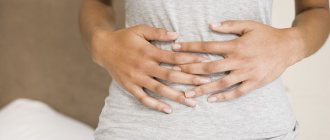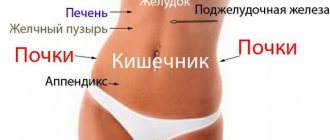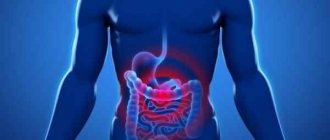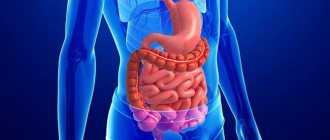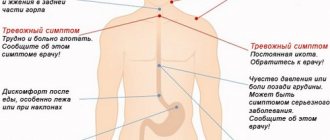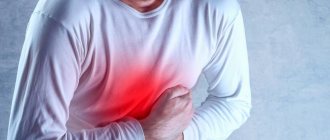If you suffer from diseases of the gastrointestinal tract, you suffer from heartburn and stomach pain, these may be symptoms of pathologies that occur in the body. Let's understand the causes and nature of stomach pain, and what measures need to be taken to alleviate the condition.
A painful burning sensation in the stomach indicates the onset of a serious gastrointestinal pathology.
Main reasons
Often, unpleasant symptoms appear with increased acidity of the stomach, but sometimes the mucous membrane becomes sensitive even with low acidity. The root causes include smoking, nervous disorders, stress, consumption of carbonated drinks, and alcohol. Large amounts of strong coffee and seasonings also irritate the mucous membrane, which can subsequently cause severe heartburn in the stomach area. Citrus fruits, fatty foods, fresh baked goods, pickled and salted vegetables also provoke increased acid production and create heartburn and pain. These are harmless causes and may disappear after dietary adjustments. If, after eliminating harmful foods, your stomach continues to hurt, nausea and sour belching bother you, the following dangerous pathologies may develop in the body:
- Gastritis. It is often the cause of disruptions in the functioning of housing and communal services. It is characterized by inflammation of the mucous membrane caused by poor lifestyle, medication, nervous system dysfunction, heredity or bacterial infection. The pain is localized in the epigastric region, sometimes accompanied by vomiting, diarrhea, stomach pressure in the morning, severe heartburn, sour taste in the mouth. Heartburn with gastritis appears immediately after eating, and dull, aching pain a few hours later.
- Stomach ulcer. Characterized by cramping pain. Heartburn and heaviness in the stomach appear after eating. Vomiting, burning, nausea, and body temperature may rise. The ulcer is mostly acute, the pain is severe, it cannot be ignored, it can lead to death.
- Reflux disease often causes epigastric pain. Acid constantly enters the esophagus. The patient is bothered by chest pain, a lump in the throat, burning, belching, dry cough and nausea.
https://youtu.be/hbEqUQF8q0g
Diseases that cause heartburn
In addition to external causes, there are internal factors that provoke the appearance of corresponding symptoms - these are diseases of the gastrointestinal tract (GIT), often associated with excess acidity of the stomach and duodenum.
Gastritis is a disease that develops as a result of a violation of the integrity of the gastric mucosa. The classification of gastritis is quite complex - it can be acute and chronic and is divided into several types, which differ in etiology, course and methods of treatment. The disease appears against the background of hereditary predisposition, bad habits, poor diet, frequent nervous shock, infection of the stomach and other gastrointestinal organs with the bacterium helicobacter pylori.
In addition to heartburn, gastritis is manifested by sharp or aching pain in the stomach, bouts of vomiting, and lack of regular bowel movements. To treat gastritis, medications are used that envelop the surface of the mucous membrane and restore it, and the patient must also adhere to a special diet.
Gastric and duodenal ulcers can occur as a complication of gastritis or as an independent ailment. When the disease occurs, defects form in the mucous membrane of the digestive organs in the form of ulcers, which, depending on the type of ulcer, may begin to bleed from time to time. In addition to poor nutrition and Helicobacter pylori infection, intoxication with alcohol, medications, and various chemicals can accelerate the appearance of ulcers.
Duodenitis is an inflammatory disease of the mucous membrane of the duodenum. It is characterized by pain in the pit of the stomach, intensifying some time after eating, and night pain in the stomach. Duodenitis is also characterized by symptoms such as periodic vomiting (bile may be present in the vomit from time to time), constipation, loss of appetite, weight loss, belching, heartburn, a feeling of “fullness” after eating, increased body temperature, and general weakness.
The causes of the disease are most often pathologies of intestinal development, food, medication, chemical poisoning, addiction to spicy foods and alcoholic beverages, and helicobacter pylori. Duodenitis is treated inpatiently, the treatment method is determined by the doctor depending on the factors that provoked it, the severity and form of the disease.
A hiatal hernia (HH) is a relaxation of the muscles of the ligamentous apparatus of the esophageal opening of the diaphragm. The hiatal hernia leads to displacement of the lower part of the esophagus, the upper part of the stomach, and intestinal loops into the chest cavity. The pathology can be caused by old age, uterine pressure during pregnancy, trauma, tumors, frequent hysterical cough, constipation, chronic diseases of the gastrointestinal tract.
Gastroesophageal reflux disease (reflux esophagitis, GERD) is a disorder of the digestive process in which the contents of the stomach are regularly released into the esophagus. The process contributes to irritation of the walls of the esophagus (less commonly, the larynx), causing a rapid feeling of satiety, burning in the chest area, heartburn and belching.
GERD is most often diagnosed in people who are prone to obesity, those employed in hazardous industries, those exposed to constant physical activity, and pregnant women. Additional symptoms that help diagnose GERD are shortness of breath, dry throat, change in voice tone, chronic cough of non-infectious origin.
Achalasia cardia
Achalasia cardia is a disease characterized by a violation of the tone of the opening located between the esophagus and the stomach (cardia). As a result, it loses the ability to open in time when swallowing, and, conversely, can open when it is not necessary. Signs of the disease are difficulty swallowing food, regurgitation, belching, vomiting, and increased salivation.
Additional Information! The disease is dangerous because the hole between the stomach can open at night, during sleep, which will lead to vomiting in an unconscious state.
The situation is fraught with suffocation and even death, so patients diagnosed with achalasia cardia are strongly recommended to sleep exclusively on their sides.
Quite often, patients of different ages complain of various functional disorders of the digestive process in the absence of morphological signs of a particular disease. In this case, the patient is diagnosed with dyspepsia and prescribed treatment aimed at eliminating specific symptoms.
Dyspepsia may include:
- chronic constipation;
- satiety too quickly, feeling of fullness in the stomach;
- frequent diarrhea in the absence of objective reasons;
- bloating;
- heartburn;
- burping;
- periodic abdominal pain.
Sometimes dyspepsia signals the early stage of gastritis or ulcers, and its manifestations can also be a consequence of a heavy feast. Most patients with complaints of digestive problems come to the gastroenterologist’s office after popular holidays - New Year, Easter, etc.
Cholecystitis
Cholecystitis is an inflammation of the gallbladder, most often having an acute development, but over time developing into a chronic condition, which is characterized by heartburn with pain. Factors contributing to the inflammatory process in the gallbladder are blockage of the bile ducts, impaired flow of bile. Cholecystitis occurs primarily as a consequence of cholelithiasis and is characterized by paroxysmal dull pain in the right hypochondrium, sometimes radiating to the area of the stomach.
During periods of exacerbation, the patient may notice yellowing of the skin, darkening of the urine, and lightening of the stool. Antibiotics, antispasmodics, and choleretic drugs are used to treat cholecystitis. If conservative treatment does not produce results for a long time, and the patient suffers from constant pain and other unpleasant sensations, the problem is solved surgically.
Other reasons
In addition to the listed pathologies, the following conditions can cause discomfort:
- Pregnancy. In the first trimester, a sharp hormonal change in the body can lead to indigestion, including heartburn accompanied by stomach pain. In the second and third trimester, the cause of attacks is the growing uterus and increased intragastric pressure. Unpleasant symptoms usually go away after childbirth.
- Recent operations in the epigastric region (removal of tumors, hernias).
- Obesity. In people who are prone to excess weight, the digestion process is almost never healthy. A distended stomach, excess food in it, slow metabolism and other disorders - all these problems cause various manifestations of dyspepsia.
Symptoms of the disease
An unpleasant taste in the mouth may indicate the development of heartburn in the patient.
Symptoms of heartburn are an unpleasant taste in the mouth, regurgitation of gastric juice, in which the acid burns the throat and makes it very hot. Manifestations can occur both during the day and at night, and are constant after eating. Sometimes accompanied by a dry cough, vomiting blood, pain in the chest, abdomen and back. Other signs:
- feeling of heaviness and fullness;
- frequent hiccups;
- bloating, flatulence;
- vomiting of undigested food;
- pain in the pit of the stomach or in the back;
- difficulty swallowing;
- your throat may hurt;
- cough, hoarse voice.
Folk remedies
The very first thing that comes to mind is the use of baking soda solution for heartburn. Everything is logical: soda is an alkali, it extinguishes the effect of acid. But soda does not have an enveloping effect, does not relieve pain, and additionally irritates the walls of the stomach.
For pain, heartburn, and nausea, complex decoctions are used: sage herb, mint leaves, chamomile. This composition has an anti-inflammatory effect, reduces acid formation, and reduces smooth muscle tension.
How is diagnostics carried out?
There are many reasons that cause heartburn in the throat after eating, so you need to diagnose them promptly and correctly. In order to quickly get rid of unpleasant symptoms, it is important to make an accurate diagnosis. Instrumental diagnostics will help to do this, aimed at visually identifying the causes and collecting biological material in the laboratory to compare the indicators with the average. Diagnostic measures include:
At the appointment, the doctor will definitely palpate the patient.
- examination and palpation of the patient;
- survey;
- general and biochemical blood test;
- Ultrasound of the digestive tract;
- gastroscopy;
- do an x-ray of the stomach.
Treatment, basic techniques
If a person is constantly bothered by heartburn and nausea, these common problems can be solved in several ways. Traditional medicine, folk recipes, and diet therapy will help get rid of discomfort. Each of these methods cannot exist independently, and only their complex use will allow treating and adjusting the digestive tract to the desired function.
Drugs
When the mucous membrane is burned, you need to take enveloping drugs such as: “Almagel”, “Sucralfate”, “Magnesium oxide”.
Medicines are divided into several groups depending on the effect they have on the disease. The drugs can envelop, relieve inflammation, reduce the production of hydrochloric acid, or have a healing effect. Thanks to the complex action, relief comes quickly. Treatment with drugs without first consulting a doctor is not recommended. For heartburn, the following groups of drugs are prescribed:
To relieve symptoms, the drug Gastracid may be prescribed.
- Drugs that neutralize acid and reduce its production: “Gastratcid”;
- "Phosphalugel";
- "Renny";
- "Relzer";
- "Vicair."
- "Motilium";
- "Omez";
- "Ranisan";
Alternative medicine
You can lower the pH in the organ with the help of almonds.
- Potato juice has proven itself well; it should be taken a third of a glass before meals, for epigastric discomfort.
- Grind anise, fennel or dill seeds in a coffee grinder, pour boiling water, leave for a few minutes and drink a glass 3-4 times a day.
- Chew almond nuts for a while, reduce acidity and envelop the burnt internal body.
- Soda solution relieves unpleasant symptoms.
- Centaury grass has a motor stimulant and eliminates food stagnation. It needs to be brewed, 1 tsp per glass of boiling water, and taken 100 ml before meals, for a course of two months.
- Tincture of marsh cudweed - 2 tablespoons per 200 ml of boiled water, also relieves inflammation and improves well-being.
Diet for heartburn
Digestive disorders can be eliminated by replacing familiar foods with more neutral and non-aggressive ones. You need to eat food often, in small portions. It is useful to eat oatmeal, preferably in the morning, dairy products, especially milk, yogurt, low-fat kefir, vegetables such as boiled beets, carrots, potatoes, celery, pumpkin. Lean varieties of meat (lean pork, rabbit), poultry (chicken, quail, goose), boiled or baked fish are recommended. Dairy vegetable soups are healthy.
If you have this problem, you need to remove chocolate from your diet.
You will have to get rid of fried, fatty, salty, spicy, smoked foods. You should not eat cold or hot food with coarse particles. For less traumatic digestion, it is recommended to chop food before eating. Mushrooms, bread, alcohol, coffee, tea, chocolate are strictly prohibited. The diet for heartburn should be followed strictly and as prescribed by the doctor. Constant heartburn in the stomach can burn the mucous membrane and aggravate the patient’s condition, and treatment will not work.
First aid for heartburn and stomach pain
Baking soda is considered an old and proven remedy for heartburn. It is diluted in water at room temperature in a ratio of 1 teaspoon/glass. This method is really effective, but its effect is short-lived - about half an hour after taking the soda solution, the secretion of hydrochloric acid in the stomach will increase, which is why the symptoms may return and even intensify.
Attention! Soda solution is contraindicated for patients suffering from peptic ulcers - in their case, carbon dioxide, which irritates the walls of the stomach, can cause bleeding.
You can alleviate the attack if you have potatoes on hand - two potatoes should be peeled, washed well, grated on a fine grater and squeezed through cheesecloth, and the resulting juice should be drunk.
Medium-fat cow's milk also relieves the symptoms of heartburn, however, it is not recommended to get carried away with this method for people with diagnosed gastritis, ulcers, and other diseases of the gastrointestinal tract.
For those who experience heartburn attacks regularly, it is useful to keep an infusion of fennel seeds, dill and anise at home. Pour boiling water over 1 tablespoon of this mixture, leave for 20 minutes, and strain. When the first unpleasant symptoms appear, you need to drink 1 glass of the decoction, and for preventive purposes it is recommended to use it daily, 1-2 glasses per day.
If heartburn is accompanied by severe pain in the stomach, you can take one tablet of No-Shpa, Spazmalgon, Spasmil M or any other antispasmodic. If this does not help, it is recommended not to self-medicate further, but to seek qualified medical help, since an attack may indicate an exacerbation of a chronic gastroenterological disease. In some cases, hospitalization may be necessary.
Acute pain in the stomach, accompanied by heartburn and other symptoms of dyspepsia, is often a sign of inflammation of the appendix. Therefore, if a person has no history of gastrointestinal diseases, and the pain does not go away for a long time (3-4 hours), it is recommended to call an ambulance.
Prevention
To consolidate the result, it is important to adhere to the recommended diet after recovery. You need to eat regularly, avoiding dry foods and fast foods. After eating, you should not engage in physical activity, bend over or squat. It is forbidden to overeat, the last meal is 4 hours before bedtime. Include all fermented milk products, clean water, vitamins and minerals in your diet on a regular basis. Quitting alcohol, smoking, and carbonated drinks will stabilize your general condition and prevent the onset of the disease.

